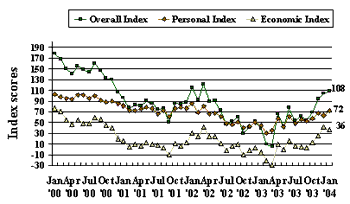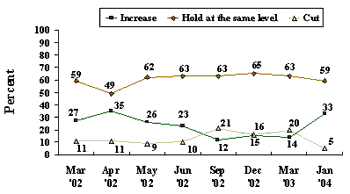GALLUP NEWS SERVICE
Investor optimism rose slightly in January, recording its fourth consecutive monthly increase, according to the Index of Investor Optimism -- a joint effort of UBS and The Gallup Organization. This increase is clearly just one of the many positive economic indicators that the Federal Open Market Committee (FOMC) may consider during its two days of monetary policy meetings that end today.
However, the contradictory movements in the dimensions of the Index may be more reflective of the real economic challenges facing both the FOMC and other policy-makers during this election year than the overall Index increases are. The Personal Dimension, which tracks investors' optimism about their own personal investment situations, increased in January -- suggesting investors are becoming increasingly optimistic about the outlook for the equities markets. However, the Economic Dimension, which measures optimism about the country's overall economic outlook, decreased mostly because of growing investor concerns about the labor markets.
Given this context, it is not surprising that most investors favor no change in interest rates with the hope that continued low rates will eventually produce significant job growth. Assuming the FOMC agrees and leaves interest rates unchanged, the real election-year economic issue may end up being whether current economic policies will be successful in creating enough new jobs to end the "jobless recovery."
Investor Optimism Shows Slight Increase
The Index of Investor Optimism rose 4 points in January on top of its 50-point increase during the fourth quarter of 2003. The overall Index now stands at 108 -- up 54 points since last September. Investor optimism has now been at essentially the same level for the past two months that it was at three years ago, when it stood at 106 in December 2000.
The Personal Dimension surged nine points in January and now stands at 72. This is its highest point since March 2002, when it stood at 80. The Personal Dimension is substantially higher now than it was a year ago (44), but is still below where it was two years ago (85).
The increase in the Personal Dimension was partly offset by the decrease in the Economic Dimension, which fell five points to 36 in January. A decline in investor optimism about unemployment (down four points) and economic growth (down two points) more than offset a slight increase in investor optimism about the stock market (up one point) to create the decline.
| Index of Investor Optimism -- U.S. January 2000 -- January 2004 |
 |
But, Investors Say the FOMC Should Not Increase Rates
Right now, investors overwhelmingly approve of current monetary policies, with 87% of those having an opinion approving the Federal Reserve Board's current interest rate policy. However, given the strong economic expansion, the highly expansive nature of both monetary and fiscal policy, and surging investor/consumer optimism during recent months, there is reason for investors to fear that the FOMC will allow interest rates to increase in the months ahead.
In this regard, investors overwhelmingly (71%) believe that the FOMC should leave interest rates at their current levels for the next three months. While most investors (59%) are optimistic that this will be the case, a growing minority (33%) fears rates will go higher in the near term.
| In the next three months, do you expect that the Federal Reserve Bank will 1) increase interest rates, 2) hold interest rates at the same level, or 3) cut interest rates? |
 |
And, Balancing the Federal Budget Should Be a Top Priority
As far as fiscal policy is concerned, investors rank "balancing the federal budget deficit" as a top or major priority for the president and Congress, with 36% saying it is a top priority, and 43% saying it is a major priority, but not the top. Thirty-six percent of investors say providing health insurance for Americans who don't have it is a top priority, and 39% say it is a major priority. Reforming Social Security is a top priority for 33% of investors; 29% say enacting stricter accounting regulations is a top priority, and 21% say increasing funds for Homeland Security is a top priority.
| Now, I am going to read you a list of issues that the Congress and the president can address in the next session of Congress. For each one, please tell me if you think it should be one of the top priority issues the president and Congress should deal with, a major priority but not top priority, minor priority, or something the Congress should not deal with it at all. |
 |
| January 2004 |
Is a "Jobless Recovery" Enough?
On Monday, Federal Reserve Board Chairman Alan Greenspan gave a cogent argument outlining the benefits of "economic flexibility" and "globalization" for both the U.S. and world economies. For example, he noted, "The increased flexibility of our labor market is now judged an important contributor to economic resilience and growth. American workers, to a large extent, see this connection and, despite the evident tradeoff between flexibility and job security, have not opposed innovation."
Greenspan went on to say, "Yet globalization is by no means universally admired … In recent years, competition from abroad has risen to a point at which developed countries' lowest skilled workers are being priced out of the global labor market."
The timing of Greenspan's address may be somewhat coincidental, but whether it is or not, it could easily be the first salvo in the "jobs" debate from those trying to moderate the job market concerns of investors and policy-makers alike. Low interest rates, stimulative fiscal policy, and strong economic growth have been good to investors and the equities markets. However, given globalization and the economic flexibility it requires, these policies may not end the "jobless" nature of the current economic expansion soon.
Greenspan's argument appears to be that the overall economic benefits of globalization far outweigh the "… high degree of pain for those caught in the job-losing segment of America's massive job-turnover process." This argument that the economy can continue to expand even without significant domestic job creation in the United States may help allay the concerns of today's investors, but whether it will be a winning proposition in the much wider political debate of the months ahead is much more dubious.
Survey Methods
Results for the Index of Investor Optimism -- U.S. are based on telephone interviews with a randomly selected U.S. sample of 801 adult investors, aged 18 and older, with at least $10,000 of investable assets, conducted Jan.1-15, 2004. For results based on these samples, one can say with 95% confidence that the maximum error attributable to sampling and other random effects is ±4 percentage points. In addition to sampling error, question wording and practical difficulties in conducting surveys can introduce error or bias into the findings of public opinion polls.

